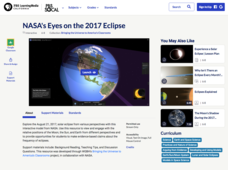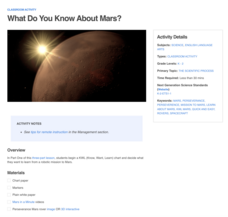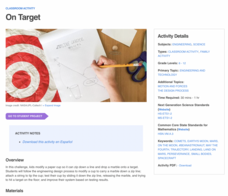National Woman's History Museum
Breaking Through Gender Roles: The Women of NASA
Whether recognized or not, extraordinary women were integral to breaking gender barriers and putting Americans into space. For Women's History Month, explore a series of video clips and biographical information that profile these...
PBS
NASA's Eyes on the 2017 Eclipse
How did the 2017 eclipse look in Los Angeles—or Chicago? Experience both views, plus many more, using a lesson from PBS's Space series for middle schoolers. Scholars follow the movements of the sun, moon, and Earth during the most recent...
NASA
Let's Investigate Mars
Take your science class on a hypothetical field trip to Mars with an engaging astronomy lesson. After first learning about NASA's Mars rover missions, young scientists plan their own scientific investigations of Earth's nearest neighbor.
Chicago Botanic Garden
Historical Climate Cycles
What better way to make predictions about future weather and climate patterns than with actual climate data from the past? Young climatologists analyze data from 400,000 to 10,000 years ago to determine if climate has changed over time....
NASA
What Do You Know About Mars?
Learn exciting facts about Earth's neighboring planet—Mars! Young scientists collaborate on a KWL chart about Mars, adding information as the activity progresses. Scholars listen while teachers read an article about Mars and watch...
Oceanic Research Group
Heat Transfer and Cooling
Astronauts train underwater to simulate the change in gravity. An out-of-this-world unit includes three hands-on activities, one teacher demonstration, and a discussion related to some of the challenges astronauts face. Scholars apply...
Teach Engineering
All About Linear Programming
Class members connect engineering with an understanding of linear programming using a technical resource. Scholars learn about linear programming (linear optimization) and how it applies to engineering design in the first of two modules....
NASA
On Target
Crash into engineering by sending a marble to land on a target by way of a zip line. Using a zip line, pupils put engineering design processes into practice by modifying a cup to carry and release a marble onto a target. Scientists test,...
PBS
Exoplanets through Kepler’s Laws
The majority of all confirmed exoplanets relied on Kepler's laws to discover their locations. Scholars learn how to apply Kepler's laws and then practice using data to discover exoplanets. They benefit from NASA video footage, NOVA...
National Woman's History Museum
Martha Hughes Cannon: Doctor, Wife, Mother, Senator
Each state is entitled to two statues in the National Statuary Hall Collection in Washington, D.C. After reading about Utah's debate over whether or not Martha Hughes Cannon should be represented by one of their statues, individuals...
Curated OER
Water in Earth's Hydrosphere
Environmentalists test stream water for temperature, pH, and turbidity. Each group shares their information and then the class makes an overall evaluation of the water quality. A slide show sets the backdrop for the teaching portion and...
NASA
Creating a Space Exploration Infrastructure
What will it take to explore space? Teams of pupils determine the needs of a lunar outpost and research the required systems. The pupils then learn about the past space exploration vehicles. The third and final lesson challenges project...
NASA
Speaking in Phases
Hear from deep space. Pupils learn how satellites transfer information back to Earth. They learn about three different ways to modulate radio waves and how a satellite sends information with only 0s and 1s. Using sound, class members...
NASA
Keeping Nine Eyes on the Weather
Take a look at climate change from another angle. Readers learn about the MISR instrument on the Terra satellite and how it studies Earth. Pupils experience how the multiple cameras give scientists multiple views so they can better study...
Chicago Botanic Garden
Impacts of Climate Change
Scholars become experts on the eight major impacts of climate change through a jigsaw and grand conversation. They then research and present what they learned about effects specific to their region.
NASA
Blinded by the Light!
Pupils learn of multiple ways astronomers look for planets outside of the solar system. By completing a hands-on activity, scholars discover that trying to see the planets directly because of the glare from the nearby star is nearly...
NASA
The Saturn System Through the Eyes of Cassini
Get a close-up view of Saturn. Pupils read a NASA eBook filled with images of the Saturn system, including the rings and moons of Saturn along with images of the planet itself. Learners become familiar with the planet's system as they...
Chicago Botanic Garden
Are You Bigfoot?
Scholars independently explore several websites to calculate their ecological footprint. Using their new found knowledge, they answer six short-answer questions and take part in a grand conversation with their peers about how our...
NASA
Exploring the Moon
Can plants grow on the moon? The second instructional activity in a five-part series has pupils explore the resources available on the moon to determine if plant life is possible. They use lava rocks as their soil and draw conclusions...
NASA
Mapping the Watery Hills and Dales
How does GPS know where everything is located? Pupils read about satellites that are mapping the ocean and the question on how satellites know where they are. Readers discover the workings of the Global Positioning System and create...
Teach Engineering
Come On Over Rover
Introduce your class to the steps that occur in the manufacturing of parts, the assembly, and the testing of a Mars rover. Pupils learn about fabrication techniques and tolerances in the manufacturing process.
American Institute of Physics
When Computers Wore Skirts: Katherine Johnson, Christine Darden, and the “West Computers”
Did you know that people, known as computers, performed the complex calculations that are now done by electronic computers? Three of these human computers, Katherine Johnson, Christine Darden, and Melba Roy Mouton are featured in a...
Teach Engineering
The Amazing Aerogel
Introducing ... the aerogel. The first of a two-installment series teaches young engineers about the properties and uses of aerogels. A PowerPoint presentation provides information about this unique material to help solidify the concept.
PBS
Data Plots of Exoplanet Orbital Properties
Scientists discovered the first exoplanet in 1995 and by early 2018, they confirmed the existence of more than 3,700—that's a lot of data! As part of the PBS 9-12 Space series, scholars interpret data about exoplanets. They compare...

























